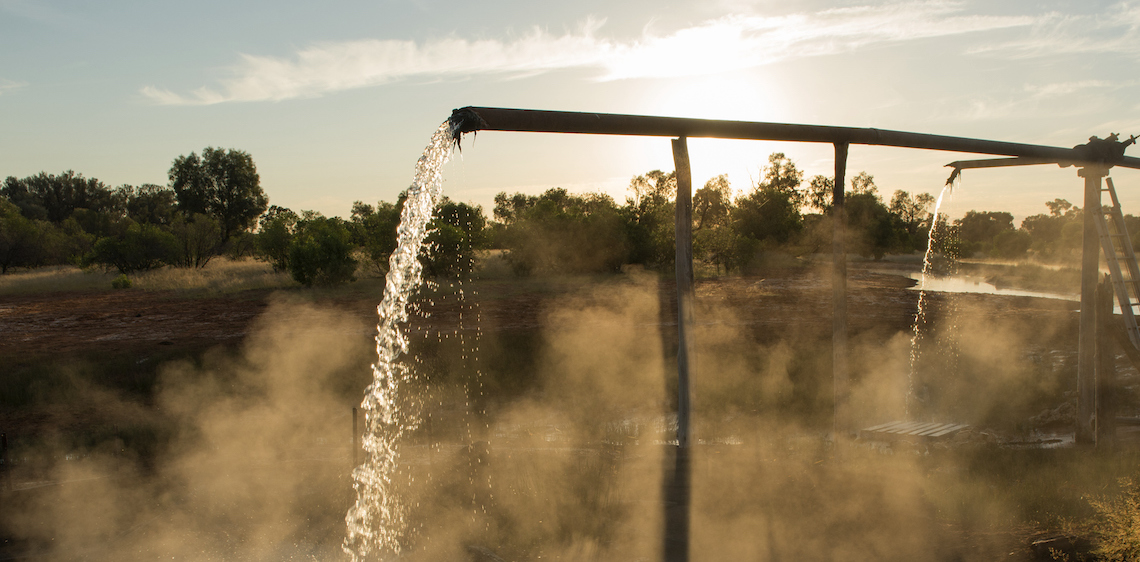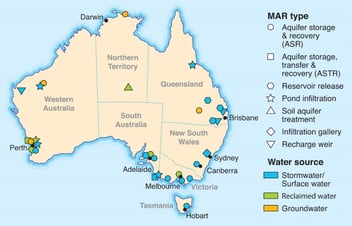Report reveals key challenges ahead for groundwater management

Communities, industries and ecosystems right across the continent are dependent on groundwater and, while Australia has come a long way in improving the sustainable management of the resource, recent research shows there is still room for improvement.
Flinders University's National Centre for Groundwater Research and Training and its national research partners have published a joint paper highlighting challenges for sustainable management of groundwater allocations moving forward.
The paper was informed by survey results of groundwater professionals from across Australia, who ranked the most pressing challenges facing the sector, including gaps in technical tools, implementation, data sharing and community understanding of groundwater systems.
Professor Peter Cook said Australia is not doing a bad job of managing groundwater by world standards but, with groundwater use increasing, there is more work that needs to be done to ensure sustainable management.
“There have been some really good steps forward in the last few decades. Overall, it’s not a doom and gloom picture. But our groundwater use continues to increase. It just about doubled between the mid-1980s and 2015,” he said.
“While it’s been raining a lot recently, we can’t afford to take our foot off the pedal. There are still a number of aquifers that are overused, where groundwater levels are going down or remain well below where they originally were.
“When we extract groundwater, the levels drop. And the ecosystems that rely on the groundwater can’t reach it anymore. We can drill a deeper bore to reach the water, but that’s not so easy for ecosystems.
“It’s probably time to have a look at what we could be doing to improve how we manage this resource.”
The National Centre for Groundwater Research and Training is a consortium of 16 universities and various government departments. In 2020, during lockdowns caused by the COVID-19 pandemic, the university partners met virtually to discuss some of the leading challenges facing groundwater management.
“We wanted to focus on areas where we could be doing better. We came up with what we thought were some of the issues that need to be improved, and then decided to put those issues out in survey form to the people working in groundwater,” Cook said.
“Survey participants included groundwater professionals in state and federal governments, private industry, and research institutions, including CSIRO. We received about 100 responses all together. It was quite a specialist group that we were approaching for the survey.”
Cook said the results help to paint a clearer picture of the key issues hindering progress in different segments of the groundwater sector, and provide a sense of where efforts should be prioritised.
Managing connected systems
Two areas that were of particular significance across the board were the question of how to manage groundwater and river systems together, as well as how to manage ecosystems reliant on groundwater sources, Cook said.
“We have been aware for 20 years or more that groundwater and rivers are connected. You can’t manage one without thinking about the other. But we still don’t really know how to manage them together very well,” he said.
“When I first started out as a researcher, groundwater was managed in the department that looked after mines, and rivers were managed in a completely different department. We aren't doing that anymore, but there are still things that could be improved.
“There are options for getting much smarter about how we manage them together, especially during times of drought. And this approach will also need to be customised to different parts of the country that have different climates.
Cook said another important issue that came out of the survey was how ecosystems are managed alongside groundwater extraction.
“Natural springs are at the top of aquifers and if we drop the aquifer level the springs dry up. Dropping aquifer levels can also affect wetlands and trees.
“We have produced maps showing where we think all our groundwater-dependent ecosystems are. But, again: how do we manage to look after them? How far can we drop the groundwater levels there before we start to negatively impact those ecosystems?
“Knowing exactly what we need to do to preserve these ecosystems and how much we can take is crucial. We need to find the balance.”
Cook said there are certainly areas where groundwater should probably not be extracted at all, due to the hugely valuable ecosystems that use the water.
“But we need to finesse how we manage this balance. It needs a lot more thinking and work. And we absolutely need to be developing the technical tools we need to manage rivers and groundwater together,” he said.
Sharing data and learning
Cook said another area that has been identified as needing improvement is data sharing, which would help to ensure access to important information about groundwater resources.
“All governments are working towards publishing their groundwater data on the web so that people can access it, but only some of the data is published. Mining company data is often not publicly available. Neither is the data collected by private companies,” he said.
“Almost all the information we have on groundwater, we get from bores. It’s like taking to a book with a hole punch. The letters that come out is all you get. And you can’t work out the whole story by collecting information in that way.
“The bigger problem is that there is a lot of data being collected, but we aren't sharing it. It's not available. Conceptually, that’s an easy fix; politically, it's a lot more complicated. But decisions around groundwater use aren't always well communicated, and so more knowledge in the community, and more time and effort in explaining decisions is needed.”
Connected to the issue of community knowledge, Cook said the survey also identified a real gap in the level of general understanding of groundwater as a resource, suggesting a groundwater literacy deficit in the broader community.
“We all know how rivers work because we can see them. We know when the river levels are high and when they are low,” he said.
“Groundwater isn’t like that. We aren't able to see it and it’s not as well understood by the broader community. It would be helpful if we could increase the understanding of how these systems behave in the community so that we can have informed conversations.
“We are in the process now of preparing some material for teachers to use in schools, to get more information out there on groundwater, partly to try to get more of our younger generation interested in studying it!
“It’s in the curriculum, but that doesn’t always mean there is great quality material that excites children to learn about the resource. We are working to provide teachers with lab experiments and science projects that can be used to exemplify how groundwater works and why it is so important.”
Next steps
Cook said the breadth and depth of various sustainable groundwater management challenges means there’s no easy fix, but the survey results stand as a good start on beginning to prioritise how to do better in managing this incredibly important resource.
“Some of the effort needed is about research questions, some of it is about more resourcing, which came in second highest in our survey results,” he said.
“This isn't a big surprise because everyone is struggling to find the people, money and time to carry out new work. It's the same as every area of the water sector. But there is also an opportunity to improve the translation of research into forms that can be used to improve management practices.
“We’ve found through the survey that different organisations at different levels of management have prioritised the challenges differently.
“These different perspectives are food for thought and likely to help us figure out how to get on the same page in terms of ensuring sustainable management of our groundwater resource.”

